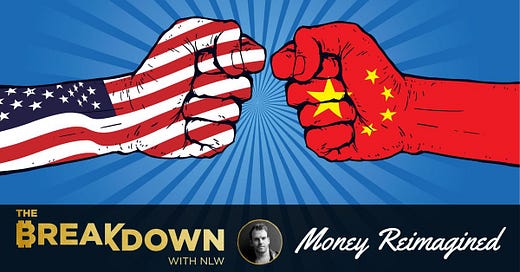Happy Saturday, Breakers
We’ve just dropped episode 2 of the special four-part The Breakdown: Money Reimagined series. It’s a documentary style show, with each episode featuring a half dozen or more perspectives. Episode 1 was all about the paradox of the strength of the dollar even as money printer go brrr. This episode looks at whether currencies like the Euro, China’s digital currency, or Libra could offer any real challenge.


The full intro from the CoinDesk piece is below:
“Some of the greatest theorists about money…thought it better to be multiple competing currencies rather than a single global standards, and there were plenty of periods in history where that was the case. Standardization of money came relatively late to the world. One of the lessons of history is that with globalization comes a tendency for a particular currency to become the number one dominant currency for transactions, for trade, for international reserves. A great question to ask is: globalization enters this phase of crisis: will there be some other transition from the dollar to another currency? Or could we see a reversion to a multipolar, multi currency world?”
-Niall Ferguson
On the first episode of Money Reimagined, we looked at the strange paradox of the U.S. dollar. On the one hand, massive stimulus fueled by "money printer go brrr" should suggest for inflation. At the same time, however, there is no denying the dollar is stronger than ever, rising in value compared to other currencies in spite of that inflation potential.
There is a sense among many, however, that this strength is relative, temporary and, above all, unsustainable. In a world where a global dollar-based monetary system does not serve the interest of the world, what replaces it?
This episode is about the sovereign contenders - in other words, the currencies that would work through existing power structures and paradigms but replace the dollar with something else.
We look first at the euro. Created in the wake of the Cold War to bind a newly reborn Europe in shared identity and economic destiny, it entered the COVID-19 crisis in a beleaguered state. Brexit had taken the most valuable economy out of the union and flagging economies within it created significant fragility. What’s more, Europe simply doesn’t have the monetary tools available to a country like the United States. Peter Zeihan, the geopolitical strategist and author of "Disunited Nations," explained it like this:
“There’s nothing that the Europeans can do in terms of stimulus spending without raising debt. Even if they decided to do something like QE - which last time took years - they would now have to have the debate over who gets how much. The Europeans are having a hard time raising the capital necessary for dealing with this crisis, whereas the US can just flip a switch.”
CoinDesk Chief Content Officer Michael Casey pointed out the European Union is also dealing with questions of political validity, with COVID-19 exacerbating a fundamental issue.
“The capacity of the EU to act in unison and the common interest the EU is supposed to represent kind of fell apart. All of a sudden, borders got shutdown and it was each nation to him or herself. So the EU’s validity to manage this has been challenged. COVID is a force for decentralizing power. From a currency perspective, the value of these currencies are political questions. Therefore the EU’s political validity is being questions right now. I’m not sure that’s going to be a very positive environment for the euro.”
The next contender profiled is the Libra project. While much of the initial conversation about the libra currency focused on the past transgressions and potential political illegitimacy of its founding organization of Facebook, for economists and system thinkers, the most powerful idea contained in the project was the idea of a global currency standard backed by a basket of the world’s fiat rather than pegged to any single currency. In many ways, this harkened back to John Maynard Keynes’ Bretton Woods proposal for a bancor - separate from the individual currencies of nations around the world. Indeed, in many ways, the most interesting impact of Libra initially was getting global central bankers like Mark Carney to propose their own "synthetic hegemonic currencies."
Finally, we look at China’s digital currency or DCEP. Is it an unbelievable surveillance honeypot? An attempt to front run the West on a key technological innovation? A method of extending economic spheres of influence? Or is it all of the above?
Listen to Money Reimagined - Episode 2 to find out.
Ps. If you haven’t yet, check out Episode 1 as well



